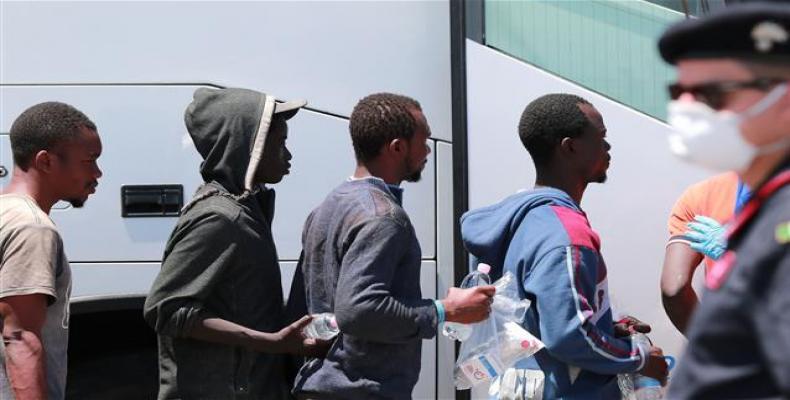Geneva, July 4 (RHC)-- Over 100,000 refugees have made the perilous Mediterranean crossing to Europe so far this year, figures by the United Nations show.
The figures released by the UN's International Organization for Migration (IOM) showed that between January 1 and July 3, more than 85,000 migrants landed in Italy, nearly 9,300 arrived in Greece, nearly 6,500 in Spain and over 270 in Cyprus.
According to IOM, nearly 2,250 people have died in 2017 attempting the sea crossing from North Africa.
Tensions have been mounting among EU nations on how to tackle the refugee crisis. Italy has taken in nearly 85 percent of the arrivals, most of them sub-Saharan Africans crossing from Libya.
Rome has pleaded for help from other European Union nations, saying it is struggling to cope. Over the weekend, Italian Interior Minister Marco Minniti called on EU neighbors to open their ports to rescue ships picking up refugees in the Mediterranean.
The Italian government has already issued a drastic threat to close its own ports to the boats. The country's Red Cross warned that the situation in overcrowded reception centers was becoming critical.
Meanwhile, IOM chief William Lacy Swing has appealed for the rest of the EU to show more solidarity. "The reception of rescued migrants cannot be seen as an issue only for Italy, but a matter for Europe as a whole."
The United Nations High Commissioner for Refugees (UNHCR) also warned that Italy cannot continue absorbing thousands of refugees on its own.
Vincent Cochetel, the UNHCR special envoy for the central Mediterranean, said "this is not sustainable." "We need to have other countries joining Italy and sharing that responsibility."
In 2015, the EU put in place a policy to distribute around 160,000 asylum-seekers across different countries. But only about 20,000 have been relocated from Italy and Greece under the scheme. Hungary, Poland and the Czech Republic have flatly refused to take part.
EU interior ministers are due to meet in Estonia's capital Tallinn on Thursday to discuss the refuges crisis.
They would also seek to defuse a long-running row over spreading asylum seekers across the bloc. Ministers meeting in Tallinn will also discuss proposals for a "code of conduct" for charities operating rescue boats in the Mediterranean.
Separately, foreign ministers from European and African countries affected by the crisis will meet in Rome on Thursday as part of a diplomatic push to stem the influx.
In an interview with France's Figaro newspaper, European migration commissioner Dimitris Avramopoulos called on Tuesday for EU countries to speed up deportations of failed asylum seekers to ease the pressure. He has however warned this needed cooperation from their home countries.
Austrian Defense Minister Hans Peter Doskozil recently warned that Vienna is set to impose border checks and deploy soldiers on its frontier with Italy if the Mediterranean influx does not slow.
While the numbers arriving in 2017 are staggering, they remain far below last year's figures. During the same period in 2016, 231,503 people made the crossing to Europe, with the 100,000-mark passed already in February that year.
Refugee Influx to Europe Hits 100,000 So Far This Year

Related Articles
Commentaries
MAKE A COMMENT
All fields requiredMore Views
- As Surgeons, We Have Never Seen Cruelty Like Israel’s Genocide in Gaza
- Cuba explores technique to reduce vector population
- Cuban foreign minister: We defend the right of law, not the right of force
- UN warns that nearly 55 million face hunger in West and Central Africa
- Real Madrid and Manchester City leave Champions League duel wide open

